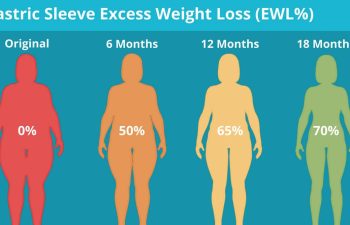
When attempting to lose weight, there are many methods that one could employ: working out precise diet plans with a nutritionist, following a strict exercise regime at the gym, and sometimes even unexpected methods like hypnosis. Sometimes, however, none of these methods may yield in the desired result. It can be extremely disheartening if this happens and then, weight loss suddenly becomes a very painstaking task. There might be a situation that the cure for an existing medical condition depends on effective weight loss. In that case, a weight loss surgery like the gastric sleeve procedure could prove to be helpful.
What Is Gastric Sleeve? How Does It Work?
A laparoscopic sleeve gastrectomy – or a gastric sleeve procedure involves the removal of approximately eighty percent of the stomach using a minimal invasive surgical procedure. This makes you feel full after a smaller meal than you were previously accustomed to and assists you in achieving weight loss.
This procedure is carried out with the help of a laparoscope, which is an instrument with a tiny camera attached to it. It gives an accurate image of the stomach which helps the bariatric surgeon in surgery. The process involves making several small incisions in the abdomen and then insertion of the laparoscope to help guide through the surgery. During a sleeve gastrectomy, a bariatric surgeon simply removes part of the stomach, leaving a portion that resembles a vertical tube or “sleeve,” which is smaller in size than a banana. The stomach therefore holds a significantly lesser amount of food at a given time.
Primarily, the smaller stomach causes two things: a reduction in the quantity of food one can consume and a generally diminished appetite as well. Both of these things contribute to weight loss.
Weight Loss Using Gastric Sleeve Procedure
It is important to note that gastric sleeve or sleeve gastrectomy is not for everyone and no two people would get the exact same results by it.
There are certain specific requirements one must meet in order to qualify. The weight loss procedure is generally reserved for adults with a BMI of 40 or higher, or individuals with a BMI of 35 or higher who also have at least one obesity-related health condition.
Having said that, the gastric sleeve procedure is not a magic bullet solution to help you achieve weight loss. There are multiple factors that come into play when determining how quickly weight reduction can happen with this procedure. It is important to follow the given guidelines post the surgery in order to ensure that you achieve the maximum benefit from the surgery.
Other than allowing your body to physically heal, you’ll also need to re-learn how to eat with your new, smaller stomach. For the first week, you will adopt a liquid-only diet, before moving on to a soft-food diet of pureed foods for the next two weeks. Following the diet plan is critical to your success because it gives the chance to your stomach to heal itself. Once you’re about three weeks into the recovery period, you’ll be able to start consuming solid foods again – but in much smaller portions than before.
Even if the weight loss is not as much as expected right away, don’t let it get you down. The weight loss makes it easier to exercise and work out, thus allowing more weight to be lost. It is a little hard to lose the initial fifty pounds of weight, but once that begins and the results begin to show, you feel the motivation to continue the healthy habits.
The Final Word – Who Should Do It? What Are The Risks?
Gastric sleeve procedure can be a very useful surgery in order to help someone lose weight. However, the only way that the procedure can lead to the desired results is if due diligence is done after the surgery and all guidelines are followed.
The U.S. National Institutes of Health (NIH) has developed five criteria points for determining whether a person is a candidate for weight loss surgery. This surgery is life-altering. Successful bariatric surgery requires hard work and effort on the part of the patient. It is also much more ideal to lose weight without the associated risks of surgery. Bariatric surgery should only be considered as a last resort and only when traditional methods have been proven unworkable or insufficient. If at all you think you are a candidate for surgery, at Weight Loss Surgery Center of Los Angeles, you will find a friendly and knowledgeable support team to guide you through each step of the process.
Posted on behalf of Dr. David G. Davtyan MD, FACS, FICS





